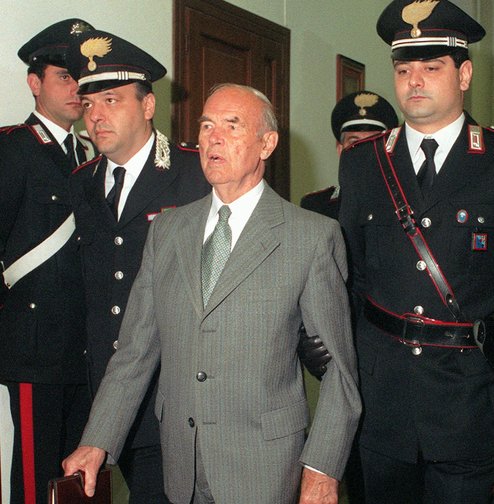Erich Priebke, a former German SS officer behind one of the worst massacres in Italy during World War II and an important figure in Italy’s struggle to reckon with its wartime past, died Oct. 11 in Rome. He was 100.
The Italian newspaper La Repubblica reported his death.
In Rome, two sites have come to represent the battles and brutality that wracked the city and country during the war: Via Rasella, a street not far from the Trevi Fountain, and the Ardeatine Caves on the outskirts of the capital. Their significance in Priebke’s life became public five decades after the war, when ABC’s Sam Donaldson confronted him on camera about the following history:
Priebke was second in command at the Gestapo headquarters in Rome on March 23, 1944, when a bomb exploded in Via Rasella and killed as many as 33 Germans marching along the street. That incident – a spectacular attack in the campaign waged by anti-fascist Italian partisans – enraged the highest ranks of the Nazi leadership. Years later, Priebke would say that Adolf Hitler personally responded with the order to execute 10 Italians for every German killed.
Nazi troops in Rome, whose commanding officers included Priebke, exceeded that demand. Over the next 24 hours, they trucked 335 Italian men and boys out of the city and called them five at a time into the Ardeatine Caves where, by candlelight, they shot the victims in the back of the head.
Other atrocities claimed more Italian lives. But no mass killing in Italy was as methodical as the slaughter at the Ardeatine Caves, said Alessandro Portelli, author of “The Order Has Been Carried Out.”
Priebke admitted to killing two of the victims and checking off the others’ names as the troops led them in.
After the war, Priebke escaped from a British POW camp and emigrated to Argentina, where he ran a delicatessen and led a German-Argentine cultural association. He did not attempt to disguise his identity. When the ABC television crew approached him in the early 1990s, Priebke did not appear surprised. Yes, he had been in the Gestapo in Rome in 1944, he told Donaldson, and, yes, he was present when the executions began.
“I feel very bad. Nobody from us wanted to do that,” he told Donaldson. “At that time an order was an order. … I was a Nazi and young man. … Many young men do things; when they are old men like me, now they are very sorry about it.”
His private life in his idyllic Andean town came to an end. Days later, when Italy moved for his extradition, he was placed under house arrest. In November 1995, after the Argentine Supreme Court rejected his bid to remain in that country, Priebke found himself back in Rome.
So began years of legal wrangling that, like many war crimes trials, showed the difficulty of fitting history into the four walls of a courtroom.
The first complaint was that it took place in a military court.
Then came a series of interruptions, including charges by the prosecution that judges were biased in favor of Priebke and an apparent escape attempt by Karl Hass, another former Nazi who was set to testify.
Rancor surrounding the trial climaxed with a confusing verdict. In August 1996, the military court found Priebke guilty of complicity in the killings but not guilty of “cruelty and premeditation,” and the case was thrown out on the grounds that the statute of limitations had expired.
At the courthouse, the victims’ family members erupted in shouts. Demonstrators blocked Priebke inside the building. Then-Prime Minister Romano Prodi promptly laid flowers at the site of the massacre in a display of his disapproval.
Priebke’s freedom lasted only a few hours. He was rearrested, facing possible extradition to Germany, and taken to the Regina Coeli prison – the same prison from which several of the men killed at the Ardeatine Caves had been selected.
During his incarceration, Priebke said was a symbol – “like the last of the Mohicans” – and that Jews were “playing a dirty game” on him.
The Italian Supreme Court denied his extradition to Germany and ordered a retrial, with Hass as his co-defendant.
In July 1997, a military court convicted both men and sentenced Priebke to 15 years, suspending all but five years. Priebke’s appeal turned out to be a tactical mistake: The conviction was upheld, and he was sentenced to lifetime imprisonment. Because of his age, he served his term under house arrest.
Send questions/comments to the editors.



Success. Please wait for the page to reload. If the page does not reload within 5 seconds, please refresh the page.
Enter your email and password to access comments.
Hi, to comment on stories you must . This profile is in addition to your subscription and website login.
Already have a commenting profile? .
Invalid username/password.
Please check your email to confirm and complete your registration.
Only subscribers are eligible to post comments. Please subscribe or login first for digital access. Here’s why.
Use the form below to reset your password. When you've submitted your account email, we will send an email with a reset code.